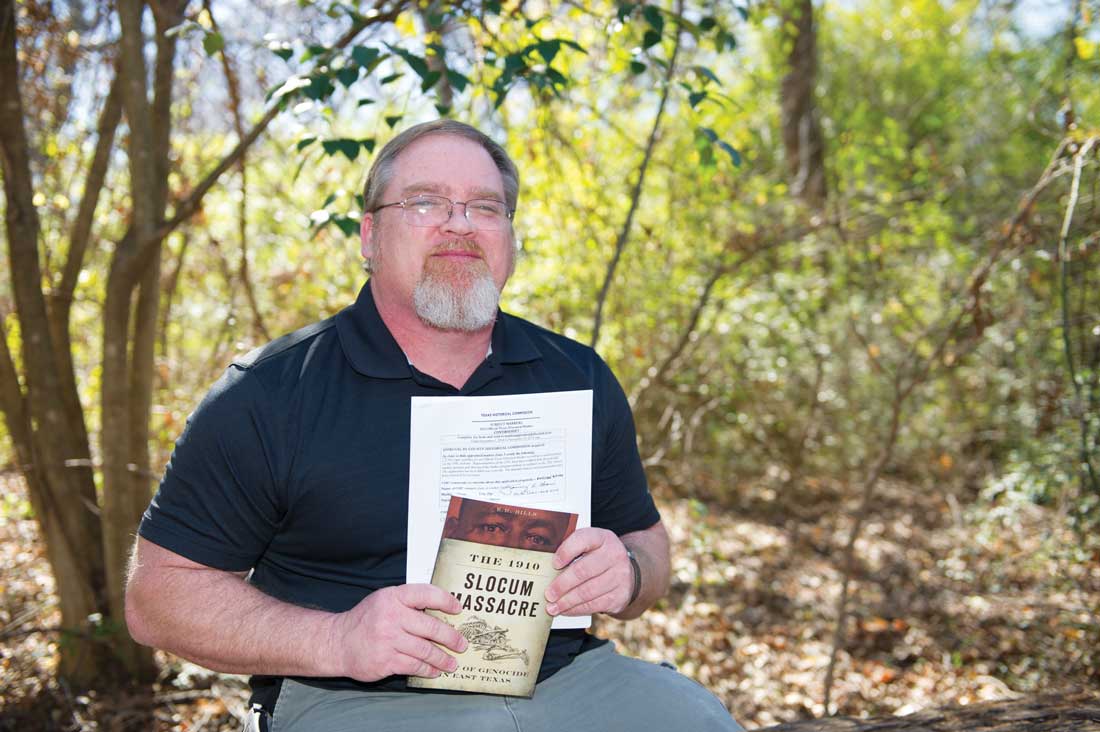When Fort Worth writer E.R. Bills began researching a century-old massacre of African-Americans in East Texas a few years back, he found a community still deeply divided by race.
“When you enter Anderson County, you have to set your watch back several decades,” he said.
Despite denials and obstruction from local officials, Bills finished his book, The 1910 Slocum Massacre: An Act of Genocide in East Texas. As the book recounts, the exact cause of the mass killing of unarmed black men, women, and children over three days has never been clear. Because many of the bodies were left in the woods or buried in mass graves, the exact number of dead is also unknown. Newspapers at the time put the numbers anywhere from 8 to 22, but other researchers have suggested the death toll was as high as 200. Seven white suspects were indicted, none convicted.
Bills’ work led him to join an effort by several of the massacre victims’ descendants to have a historical marker placed in Slocum to commemorate the tragedy. As with the book, Bills said, local officials have fought the effort. State officials found the marker request to be a well-documented and deserving piece of history, and the Texas Historical Commission went outside its usual procedures to approve the marker without local officials’ concurrence.
However, local opposition continues. County officials may be able to delay the marker for another year, and one county commissioner predicted that, if it were erected, the marker would be torn down.
Constance Hollie-Jawaid, a Dallas schools administrator, lost ancestors in the slaughter. Her family has been working for decades to get the marker. Her great-great-grandfather Jack Hollie was a freed slave who moved to Slocum and amassed 700 acres of farmland there. His son Marsh developed the farm into one of the largest in the area.
“They were very prosperous,” Hollie-Jawaid said. “Some [back then] would say too prosperous.”
Marsh escaped the massacre but lost a brother, a nephew, and several cousins. The killings were devastating for the family, Hollie-Jawaid said, both in loved ones murdered and in the loss of everything they had worked to build. Marsh eventually resettled in nearby Palestine, where Constance was born several decades later.
After hearing Hollie-Jawaid on a Dallas radio program, Bills reached out to her. It was then that she learned of his book, and he learned about her family’s efforts to get the historical marker.
Applications for such markers are initially handled by county historical commissions before being sent to the Texas Historical Commission. At first, Hollie-Jawaid said, state and Anderson County officials denied outright that the massacre had happened.
“They acted like this was a fairy tale that we were making up,” she recalled. “We’d be laughed at and not helped with requests for certain things. With the advent of the internet, things really started to move.”
Bills learned that attempts in the 1980s to get a similar marker erected in neighboring Houston County, where black citizens fleeing the massacre had sought refuge, had also been stymied. G.J. Hays, a physician sympathetic to the massacre victims, had corresponded with Eliza Bishop, then chairwoman of that county’s historical commission, about getting a marker.
Barbara Wooten, who more recently chaired that commission, said a cache of letters between Hayes and Bishop was discovered in Bishop’s home after she died in 2011.
“I’m not going to say [Bishop] deliberately hid the application,” Wooten said. “The community was hostile toward [this marker] then, and they are still hostile toward it now. She knew it was going to upset white folks.”
With the recent media exposure, Wooten said, her commission would support creation of such a marker but that someone outside the commission would have to request it.
Bills and Hollie-Jawaid’s first big break came in 2011 when then-State Rep. Marc Veasey of Fort Worth sponsored a resolution, which the Texas Legislature approved, acknowledging the atrocity.
“Racial tensions ran high in Slocum,” Veasey said at the time. “It was an unfortunate occurrence that went unnoticed in Texas history for many years.”
A week after the resolution passed, the Anderson County Commissioners Court raised the Confederate flag over their courthouse for the first time since 2001, citing a recently proclaimed countywide Confederate History and Heritage Month. The timing was unsettling for Bills and Hollie-Jawaid. Some residents made it clear that the two might be in physical danger when they visited the area.













Eddie, bless your heart, your new book tickles me to death. I’m really proud of you. I can’t think of much that could make me happier. I wish your Daddy was here to see it. Good work, it’s a privilege to know you.
Thanks Benny. That’s why I dedicated the book to him. I was inestimably lucky not to be raised with the terrible baggage of racism.
E.R., it must be truly grand to feel morally superior to the entire populace of Anderson County, Texas. Kudos.
Doesn’t seem too challenging of a feat though. Amazing that’s what you took away from such a moving article.
Ever single peckerwood BIGOT Tea-Bagger in East Texas combined dosen’t amount to a hair on Mr. Bills hiney. Bigots, Baggers, butt-holes, bone-heads….more plentiful than johnson-grass. You can see them most any time’ stumbling from the doorway of the Startle-Gram, bunched up around the Petrolium Club bar, and the Public Health Centers V.D. counter. Unless the Bible is lying, their future looks kind of sad.
Speaking as his birddog, I can vouch that my master, Benny, knows what he is talking about. He has spent enough time at health department V.D. (aka S.T.D.) counters to know the class of people who come there.
The only thing you Startle-Gram suckers resemble, concerning my sweet Roxy, is her stinking hiney-boe. Did your boss demand you disassociate your childish 5th grade trash from his limp-along High-Society rag? Anyone who follows the Weekly is aware of your idenity and employer and soulmates.Why do you hate normal folks, and poor people, and deaf, sick, black Americans? It will be not nearly as fun mocking a pampered, snot-rag, Repug, rich kid, newspaper reporter if you hide like a Klu-Kluxer. You’re a coward with an education that is being wasted as a Tea-Bagging dunder-head. I urge you again to repent and become an honorable American. You’re young enough, smart enough, and have all the connections. Amount to something, I’m truly praying for you.
Master, that you loathe the Star-Telegram is obvious. Can’t figure that out. I always thought of it as a left wing rag. Nice to train a dog with. FWW too,
Bite it Bubba. Clearly, there’s many things you’ve missed figuring out. One of those things is the pleasure of looking out from the eyes of an humble, honest, charitable member of God’s universe. Sincerely, on the square, I’m praying for you.
I just snapped Stouty. “I always thought of theStar-Telegram”…..did you quit, were you canned? I haven’t seen any snarky comments from you buddies at the paper lately. Come clean man, what’s the deal? Did the boss think our public conversations were bad for business? I haven’t seen anything from you buddy’s at the paper in a while. What’s up? Come clean man. O.K.?
NEW DEVELOPMENT
The head of SFA’s Archaeology Department has said he will donate his time and the university’s equipment, including their Ground Penetrating Radar machine to assist in locating the bodies from the Slocum Massacre! On March 11th, massacre descendant Constance Hollie Jawaid will be meeting professors and forensic archaeology students from SFA in Slocum, Texas to begin the official search and recovery process.
Now isn’t this somthing, Eddy? Blow my dress up!!! Yeeeeehawwww! See what you have done here? Restores my faith!!!